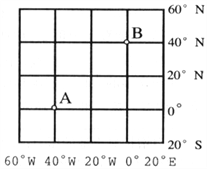
”¾ĢāÄæ”æĻĀĶ¼ĪŖ”°µŲĒņ¹«×ŖŹ¾ŅāĶ¼”±£¬¶ĮĶ¼»Ų“šĪŹĢā”£

£Ø1£©µŲĒņ×Ō×ŖÓė¹«×ŖµÄ·½ĻņŅ»ÖĀ£¬¶¼ŹĒ ”£µŲĒņ¹«×ŖŅ»Öܵď±¼äŹĒ ”£
£Ø2£©µŲĒņ×Ō×ŖŠĪ³ÉĮĖÖēŅ¹øüĢę”£µŲĒņ ŠĪ³ÉĮĖĖļ¾øüĢę”£
£Ø3£©3ŌĀ21ČÕĒ°ŗó£¬Ģ«Ńō¹āÖ±ÉäŌŚ ÉĻ”£µ±Ģ«Ńō¹āÖ±ÉäŌŚÄĻ»Ų¹éĻßÉĻŹ±£¬µŲĒņ¹«×ŖÖĮĶ¼Ź¾¼×”¢ŅŅ”¢±ū”¢¶”ÖŠµÄ “¦£¬ÕāŅ»ĢģµÄ½ŚĘųĪŖ±±°ėĒņµÄ ČÕ”£
£Ø4£©Ņ»ÄźÖŠ£¬ÄĻĶØŹŠÕżĪēĢ«ŃōÉżµĆµÄø߶Ȕ£ĻÄÖĮČÕ×īøߣ¬µŲĆęĪļĢåµÄÓ°³¤×ī¶Ģ£»¶¬ÖĮČÕÉżµĆ×īµĶ£¬µŲĆęĪļĢåµÄÓ°³¤×ī³¤”£Ķ¼15ĪŖĪŅŹŠÄ³Š£µŲĄķŠĖȤŠ”×éŌŚÄ³Äź3ŌĀ21ČÕ”¢6ŌĀ22ČÕ”¢9ŌĀ23ČÕŗĶ12ŌĀ22ČÕ»ęÖʵĔ°Ä³½ĢѧĀ„ÕżĪēÓ°³¤Ź¾ŅāĶ¼”±”£ ¢Ł”¢¢Ś”¢¢Ū”¢¢ÜĖÄĶ¼ÖŠ£¬æɱķŹ¾ĻÄÖĮČÕøĆ½ĢѧĀ„ÕżĪēÓ°³¤µÄŹĒ ”£

”¾“š°ø”æ(1)×ŌĪ÷Ļņ¶«Ņ»Äź(365ČÕ)(2)¹«×Ŗ
(3)³ąµĄ(0”ćĪ³Ļß)¼×¶¬ÖĮ (4)¢Ś
”¾½āĪö”æ±¾Ģāæ¼²éµŲĒņµÄ¹«×Ŗ»ł±¾ĢŲÕ÷¼°Ęä²śÉśµÄµŲĄķĻÖĻó”£
£Ø1£©µŲĒņ×Ō×ŖÓė¹«×ŖµÄ·½ĻņŅ»ÖĀ£¬¶¼ŹĒ×ŌĪ÷Ļņ¶«£®µŲĒņ¹«×ŖŅ»Öܵď±¼ä Ņ»Äź£®
£Ø2£©µŲĒņ×Ō×ŖŠĪ³ÉĮĖÖēŅ¹øüĢę£¬µŲĒņ¹«×ŖŠĪ³ÉĮĖĖļ¾øüĢę”£
£Ø3£©3ŌĀ21ČÕĒ°ŗó£¬Ģ«Ńō¹āÖ±ÉäŌŚ³ąµĄÉĻ£¬µ±Ģ«Ńō¹āÖ±ÉäŌŚÄĻ»Ų¹éĻßÉĻŹ±£¬µŲĒņ¹«×ŖÖĮĶ¼Ź¾¼×”¢ŅŅ”¢±ū”¢¶”ÖŠµÄ¼×“¦£¬ÕāŅ»ĢģµÄ½ŚĘųĪŖ±±°ėĒņµÄ¶¬ÖĮČÕ¼“12ŌĀ22ČÕ”£
£Ø4£©Ņ»ÄźÖŠ£¬ÄĻĶØŹŠÕżĪēĢ«ŃōÉżµĆµÄø߶ČĻÄÖĮČÕ×īøߣ¬µŲĆęĪļĢåµÄÓ°³¤×ī¶Ģ£»¶¬ÖĮČÕÉżµĆ×īµĶ£¬µŲĆęĪļĢåµÄÓ°³¤×ī³¤£®
£Ø5£©¢Ł”¢¢Ś”¢¢Ū”¢¢ÜĖÄĶ¼ÖŠ£¬æɱķŹ¾ĻÄÖĮČÕøĆ½ĢѧĀ„ÕżĪēÓ°³¤µÄŹĒ¢Ś£¬øĆ½ŚĘųĢ«Ńōø߶Č×ī“ó”£



| Äź¼¶ | øßÖŠæĪ³Ģ | Äź¼¶ | ³õÖŠæĪ³Ģ |
| øßŅ» | øßŅ»Ćā·ŃæĪ³ĢĶĘ¼ö£” | ³õŅ» | ³õŅ»Ćā·ŃæĪ³ĢĶĘ¼ö£” |
| ø߶ž | ø߶žĆā·ŃæĪ³ĢĶĘ¼ö£” | ³õ¶ž | ³õ¶žĆā·ŃæĪ³ĢĶĘ¼ö£” |
| øßČż | øßČżĆā·ŃæĪ³ĢĶĘ¼ö£” | ³õČż | ³õČżĆā·ŃæĪ³ĢĶĘ¼ö£” |
æĘÄæ£ŗ³õÖŠµŲĄķ Ą“Ō“£ŗ ĢāŠĶ£ŗ
”¾ĢāÄæ”æ¶ĮŹĄ½ēÄźĘ½¾ł½µĖ®Įæ·Ö²¼Ķ¼£¬»Ų“šĪŹĢā”£

£Ø1£©¼×µŲµÄ½µĖ®Ö÷ŅŖŹōÓŚ ½µĖ®ĄąŠĶ£¬ŅŅµŲµÄ½µĖ®Ö÷ŅŖŹōÓŚ ½µĖ®ĄąŠĶ”£
£Ø2£©±ūµŲµÄ½µĖ®Ō¶Ō¶¶ąÓŚ¶”µŲ£¬Ó°ĻģŅņĖŲŹĒ ”£
£Ø3£©ĪģµŲµÄ½µĖ®±ČŅŅµŲ £Ø¶ą”¢ÉŁ£©£¬Ó°ĻģŅņĖŲŹĒ ”£
£Ø4£©ĒėÄćĖµ³öŹĄ½ēÉĻ½µĖ®±Č½Ļ¶ąµÄµŲĒųÓŠ ”¢ ”¢
²éæ““š°øŗĶ½āĪö>>
æĘÄæ£ŗ³õÖŠµŲĄķ Ą“Ō“£ŗ ĢāŠĶ£ŗ
”¾ĢāÄæ”æČÕ±¾¶ŌĶāĆ³Ņ×µÄÖ÷ŅŖĢŲµćŹĒ£Ø””””£©
A£®“óĮæ½ųæŚ¹¤Ņµ²śĘ·£¬³öæŚŌĮĻŗĶČ¼ĮĻ
B£®“óĮæ½ųæŚŌĮĻ”¢Č¼ĮĻ£¬³öæŚ¹¤Ņµ²śĘ·
C£®“óĮæ½ųæŚŌĮĻ”¢Č¼ĮĻ£¬³öæŚÅ©Ņµ²śĘ·
D£®½ųæŚŌ²ÄĮĻÉŁ£¬³öæŚ¹¤Ņµ²śĘ·¶ą
²éæ““š°øŗĶ½āĪö>>
æĘÄæ£ŗ³õÖŠµŲĄķ Ą“Ō“£ŗ ĢāŠĶ£ŗ
”¾ĢāÄæ”æ¶ĮĶ¼ĻĀĆę¾Ī³Ķų²¢Ķź³ÉĪŹĢā

£Ø1£©Š“³öA”¢BĮ½µŲµÄ¾¶ČŗĶĪ³¶Č£ŗ
A___________Ӣ__________B____________Ӣ__________ӣ
£Ø2£©BµŲĪ»ÓŚAµŲµÄ__________·½Ļņ”£
£Ø3£©BµŲŹōÓŚĪĀ¶Č“ųÖŠµÄ____“ų£¬AµŲĪ»ÓŚĪ³¶Č“ųÖŠµÄ____(µĶ”¢ÖŠ”¢øß)Ī³¶Č”£
£Ø4£©AµŲĪ»ÓŚ_____(¶«»ņĪ÷)°ėĒņ£»BµŲĪ»ÓŚ____(±±”¢ÄĻ)°ėĒņ”£
£Ø5£©A”¢BĮ½µŲÄÄøöµŲ·½Ć»ÓŠĢ«Ńō¹āÖ±ÉäĻÖĻó_____________”£
£Ø6£©A”¢BĮ½µŲÄÄøöµŲ·½ĘųĪĀ½Ļøߣæ___________________”£
²éæ““š°øŗĶ½āĪö>>
æĘÄæ£ŗ³õÖŠµŲĄķ Ą“Ō“£ŗ ĢāŠĶ£ŗ
”¾ĢāÄæ”æ¹ŲÓŚŹ×¶¼±±¾©µÄŠšŹö£¬²»ÕżČ·µÄŹĒ( )
A.×ŪŗĻŠŌ¹¤Ņµ³ĒŹŠ
B.Č«¹ś¾¼ĆÖŠŠÄ
C.¹ś¼Ź½»Ķł³ĒŹŠŗĶĀĆÓĪŹ¤µŲ
D.ĪŅ¹śÖŲŅŖµÄµē×Ó¹¤ŅµÖŠŠÄ
²éæ““š°øŗĶ½āĪö>>
æĘÄæ£ŗ³õÖŠµŲĄķ Ą“Ō“£ŗ ĢāŠĶ£ŗ
”¾ĢāÄæ”æµ±µŲŹ±¼ä2018Äź7ŌĀ2ČÕ11Ź±36·Ö£¬ŌŚ°ĶĮÖĀóÄÉĀó¾ŁŠŠµÄµŚĖÄŹ®¶ž½ģŹĄ½ēŅŲś“ó»įÉĻ£¬¾ĮŖŗĻ¹ś½ĢæĘĪÄ×éÖÆŹĄ½ēŅŲśĪÆŌ±»įĶ¬Ņā£¬ÖŠ¹ś¹óÖŻ____________»ń×¼ĮŠČė”¶ŹĄ½ēŅŲśĆūĀ¼”·”£ÖĮ“Ė£¬ĪŅ¹śŹĄ½ēŅŲśŌöÖĮ53“¦£¬ŹĄ½ē×ŌČ»ŅŲśŌöÖĮ13“¦”£ŹĄ½ē×ŌČ»ŅŲś×ÜŹż³¬Ō½Ö®Ē°²¢ĮŠµÄ°Ä“óĄūŃĒŗĶĆĄ¹ś£¬¾ÓŹĄ½ēµŚŅ»”£
A. ø£ČŖɽ B. čó¾»É½ C. ŌĘĢØɽ D. ĪŚĆÉɽ
²éæ““š°øŗĶ½āĪö>>
æĘÄæ£ŗ³õÖŠµŲĄķ Ą“Ō“£ŗ ĢāŠĶ£ŗ
”¾ĢāÄæ”æ The Lantern Festival is a traditional Chinese festival, which is on the 15th of the first lunar month. Here are some things you should know about the Lantern Festival.
The origins of Chinese lanterns
The origins of Chinese lanterns reach back to the Stone Age. The coming of the Bronze Age saw the development of different kinds of worked metal lanterns, of which palace lanterns were the most ornate. Later, decorative lanterns came to be used in festivals. All kinds of lantern festivals became quite popular during the Sui Dynasty. During the Southern Song Dynasty, a festival in Qinhuaihe in Nanjing featured over 10,000 lanterns. During the Qing Dynasty, magnificent exhibitions of lanterns were held in the capital city. Lantern contest were also held, with the dragon lantern being the most famous competitor.
A sea of lanterns
The biggest attraction of the Lantern Festival is the sea of lanterns in every size and shape. Chinese started to celebrate the Lantern Festival during the Han Dynasty, and then it became popular during the Tang and Song dynasties. This is a festival for people to have fun.
At night, people go into the streets with a variety of lanterns under the full moon, try to solve Chinese riddles and play games, enjoy traditional food called Yuan Xiao and set off fireworks. There is really a lot of fun for the young and the old. They also watched the lion or dragon dance. Chinese dragons are a symbol of China, and they are believed to bring good luck to people, therefore the longer the dragon is in the dance, the more luck it will bring to the community.
7-day holiday in the Song Dynasty
While modem people complain that they have to work on this day, they would be surprised to know that people living in the Song Dynasty could take seven days off. According to the Wen Chang Za Lu, an ancient documentary book, people who enjoy several seven-day holidays: the Spring Festival, the day before the Pure Bright Festival, the Winter Solstice, the birthday of the emperor and the Lantern Festival.
”¾1”æWhen did all kinds of lantern festival become popular?
A. During the Bronze AgeB. During the Stone Age
C. During the Sui DynastyD. During the Han Dynasty
”¾2”æWhy do people perform dragon dance during the Chinese New Year?
A. Because dragons are very important for the old.
B. Because dragons are believed to bring good luck.
C. Because the dragon is a symbol of the emperor.
D. Because the dragon dancers can get some money.
”¾3”æWhich activity about the Lantern Festival is NOT mentioned in the passage?
A.  B.
B.  C.
C.  D.
D. 
”¾4”æPeople in Song Dynasty could have at least days off throughout the whole year.
A. sevenB. fourteenC. twenty-eightD. thirty-five
”¾5”æWhat”Æs the best title of the passage?
A. Holidays during traditional Chinese festivals.
B. Something about Lantern Festival.
C. How people celebrate the Lantern Festival
D. The Lantern Festival in ancient China.
²éæ““š°øŗĶ½āĪö>>
æĘÄæ£ŗ³õÖŠµŲĄķ Ą“Ō“£ŗ ĢāŠĶ£ŗ
”¾ĢāÄæ”æ”°ĪŅĆĒŃĒÖŽ£¬É½ŹĒøß°ŗµÄĶ·”±ŃĒÖŽ²»½öÓŠŹĄ½ēÉĻ×īøßµÄøßŌ£¬£¬»¹ÓŠŹĄ½ēÉĻ×īøß“óµÄɽĀöŗĶɽ·å”£“Ó·Ö²¼Ą“æ“£¬ÕāŠ©øßŌ”¢É½µŲÖ÷ŅŖ·Ö²¼ŌŚŃĒÖŽµÄ£Ø £©
A”¢¶«²æ B”¢ÄĻ²æ
C”¢Ī÷²æ D”¢ÖŠ²æ
²éæ““š°øŗĶ½āĪö>>
æĘÄæ£ŗ³õÖŠµŲĄķ Ą“Ō“£ŗ ĢāŠĶ£ŗ
”¾ĢāÄæ”æŌŚ1£ŗ38000000µÄ±ČĄż³ßµŲĶ¼ÉĻ£¬±±¾©µ½ÉĻŗ£µÄÖ±Ļß¾ąĄėĪŖ2.8ĄåĆ×£¬Ōņ±±¾©µ½ÉĻŗ£µÄŹµ¼Ź¾ąĄėŹĒ( )
A. 2128Ē§Ć× B. 1596Ē§Ć×
C. 1064Ē§Ć× D. 532Ē§Ć×
²éæ““š°øŗĶ½āĪö>>
°Ł¶ČÖĀŠÅ - Į·Ļ°²įĮŠ±ķ - ŹŌĢāĮŠ±ķ
ŗž±±Ź”»„ĮŖĶųĪ„·ØŗĶ²»Į¼ŠÅĻ¢¾Ł±ØĘ½ĢØ | ĶųÉĻÓŠŗ¦ŠÅĻ¢¾Ł±Ø×ØĒų | µēŠÅÕ©Ę¾Ł±Ø×ØĒų | É꥜Ź·ŠéĪŽÖ÷ŅåÓŠŗ¦ŠÅĻ¢¾Ł±Ø×ØĒų | ÉęĘóĒÖČؾŁ±Ø×ØĒų
Ī„·ØŗĶ²»Į¼ŠÅĻ¢¾Ł±Øµē»°£ŗ027-86699610 ¾Ł±ØÓŹĻä£ŗ58377363@163.com